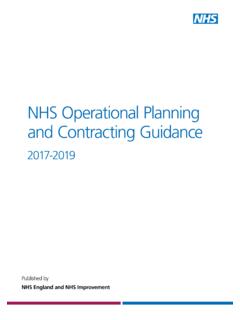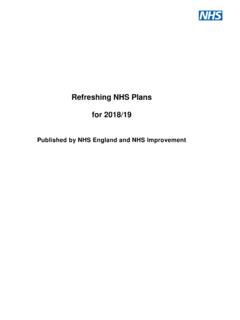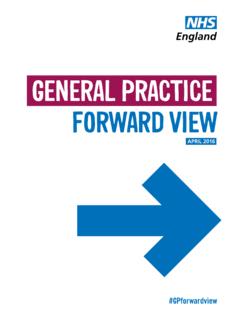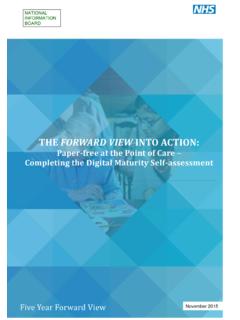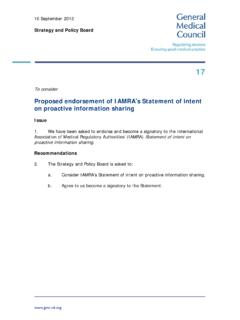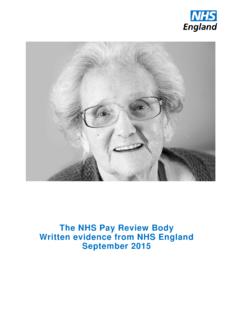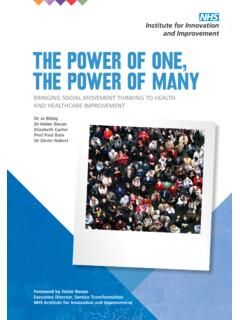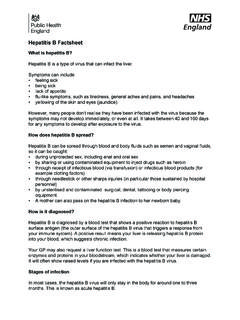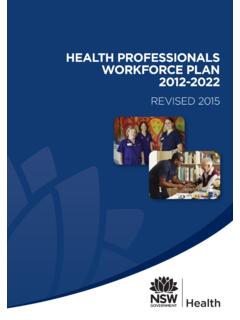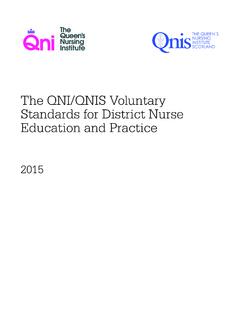Transcription of Delegation of healthcare tasks to personal assistants
1 Delegation of healthcare tasks to personal assistants within personal health budgets and Integrated personal CommissioningIntegrated personal CommissioningDelegation of healthcare tasks to personal assistants within personal health budgets and Integrated personal Commissioning2 NHS England Information Reader BoxDirectorateMedicalNursingFinanceOpera tions and informationTrans. and Corp. commissioningCommissioning strategyPublications Gateway Reference:06636 Document purposeGuidanceDocument nameDelegation of healthcare tasks to personal assistants within personal health budgets and Integrated personal CommissioningAuthorNHS England/Personalisation and ChoicePublication dateJune 2017 Target audienceCCG Clinical Leaders, CCG Accountable Officers, CSU Managing Directors, Care Trust CEs, Foundation Trust CEs, NHS Trust CEsAdditional circulation listDirectors of nursing , Local Authority CEs, Directors of Adult SSs, allied Health Professionals, Directors of Children s ServicesDescriptionThe personal assistant Delegation guide provides a framework for the Delegation of healthcare tasks to personal assistants supporting adults, children and young peopleCross referenceN /ASuperseded docs (if applicable)
2 N /AAction requiredN /ATiming/deadlines (if applicable)N /AContact details for further informationPersonalisation and Choice Skipton House 80 London Road London SE1 6 LHDocument StatusThis is a controlled document. Whilst this document may be printed, the electronic version posted on the intranet is the controlled copy. Any printed copies of this document are not controlled. As a controlled document, this document should not be saved onto local or network drives but should always be accessed from the of healthcare tasks to personal assistants within personal health budgets and Integrated personal Commissioning3 Contents1 Introduction 42 The case for delegating healthcare tasks to personal assistants 53 Ensuring appropriate governance and assurance arrangements 74 Developing a robust process for Delegation Identify the tasks to be delegated Identify how training and assessment of competence will be provided Sign-off and review 105 Roles, responsibility and accountability The commissioner The care coordinator The registered practitioner The personal health budget holder.
3 Nominee or representative acting as employer The personal assistant 176 Key learning and advice 18 References 19 Delegation of healthcare tasks to personal assistants within personal health budgets and Integrated personal Commissioning41 IntroductionThe NHS Five Year Forward View1 set out a clear direction for the NHS including a commitment to a new relationship with patients and communities . Giving people more control, including through personal health budgets and Integrated personal Commissioning (IPC), is a core part of achieving this and increasing the direct control people have over the care that they many people, employing a personal assistant (PA) or a team of PAs is a central part of creating care and support arrangements that are personalised and responsive to their individual needs and circumstances as an adult or child and as a family.
4 PAs, chosen by the individual and where appropriate their carers, or in the case of children their parents, can help support people living in the community to achieve their personal goals and to have the opportunity to lead their lives and have a family life on their own PA s role will vary according to the needs, lifestyle requirements and choices of each person they support. When a PA is providing care and support to someone with healthcare needs, an important component of their role can include carrying out tasks that are of a clinical nature. These tasks must be considered in the care planning process and delegated to the PA by a registered practitioner who has the relevant occupational competence. They must only be delegated when it is in the best interests of the person framework identifies the elements required to support appropriate Delegation of a healthcare task from a registered practitioner to a PA, and the responsibilities of all concerned.
5 It aims to help registered practitioners understand the decision-making process involved in Delegation , and to help clinical commissioning groups (CCGs) to establish clear protocols for ensuring safe and appropriate Delegation to PAs, so that responsibilities and lines of accountability are understood by all. It is not intended to specifically cover issues relating to agency carers and other support workers, although many of the principles may be relevant to them too. It is informed by work carried out in NHS organisations over a period of two years from 2014 to 2016, supported by Skills for is important to note that registered practitioners are professionals who are regulated by statute and so are specifically accountable to their regulatory body as well as to their employer.
6 This guidance does not circumvent any standards for Delegation set by their regulatory body, which they are required to meet ( the nursing and Midwifery Council (NMC) for nurses, midwives and health visitors, and the Health and Care Professions Council (HCPC) for physiotherapists, occupational therapists, dieticians, speech and language therapists). Delegation of healthcare tasks to personal assistants within personal health budgets and Integrated personal Commissioning52 The case for delegating healthcare tasks to personal assistantsThe ability for individuals to employ their own PA or carer is one of the biggest opportunities presented by personal health budgets. It means that people are able to choose who they want to provide their care and support and they can more flexibly control how it is delivered to suit the needs and lifestyle of themselves and their family.
7 As a growing workforce in healthcare , PAs make an important contribution to supporting the health and wellbeing of people in the community. Where the people they support have requirements for clinical interventions, delegating some carefully considered tasks to PAs can have benefits for all involved. There will also be tasks that are considered unsuitable for Delegation because of the complexity of the task, the degree of judgement required or individual circumstances. PAs can play an important role supporting the work of the wider multidisciplinary team, but do not substitute the need for skilled, registered practitioners working in the should be recognised as something that is a considered process and properly supported. This will help ensure that the best interests of the person are always paramount, that tasks taken on by PAs are appropriate, and that PAs are provided with relevant training and assessed as competent to perform the particular a task can be appropriately delegated to a PA, a number of benefits have been identified, including: The person s needs can be responded to in a timely manner, when and where they require, enabling them to get on with their life while knowing that they and their PA have access to support and clinical advice from a registered practitioner when required.
8 I ve found having a personal health budget has had a major impact on my life, it s given me a lot more choice and independence in what carers I choose, what they are trained in and how they assist me. Without this it would be a lot more difficult to live out of my family home and live independently with my partner. Also to set up my own business and move ahead with my life. Matt, personal health budget holder. The PA may have developed a very good understanding of the person s individual preferences and needs and have particular skills in communicating with them. This relationship, alongside their availability, can mean a PA is ideally placed to take on some healthcare tasks when appropriately delegated to them. Just recently when Manish had a hospital admission his PAs were able to support him in hospital.
9 They stayed overnight with him, which was a huge support because he felt confident in their ability to care for him. Jacqui Giddings, Community Children s Nurse, South Warwickshire NHS Foundation of healthcare tasks to personal assistants within personal health budgets and Integrated personal Commissioning6 Appropriate Delegation can make best use of NHS workforce resources and skills, increasing efficiency and providing longer term savings in staff time and costs. It can increase staff satisfaction through enabling effective use of skills. The beauty of delegated healthcare tasks being taught to PAs is that Matt s got so much more flexibility in his care arrangements and he can come and go as he pleases throughout the day. We can also much more efficiently use the healthcare professionals that we have got, the budgetary implications of having a qualified nurse here 24 hours a day would be impossible.
10 Julia, nurse who provides tracheostomy training to Matt s PAs. Appropriate Delegation to PAs can enable people to stay living at home, support more speedy and effective hospital discharge and prevent or reduce hospital admission. Ultimately that s what it s all about keeping people safe in their own homes and ensuring good practice to increase the quality of life and reduce hospital admissions. Angela Milbourne, Clinical Matron, James Cook Hospital, Middlesbrough. For the PA, developing new skills and being able to more fully meet the person s needs can help make the role more rewarding and help PAs feel valued, motivated and recognised in their work. Associated training and assessment of competence can help provide evidence of their skills and knowledge and support recruitment, retention and career progression.
